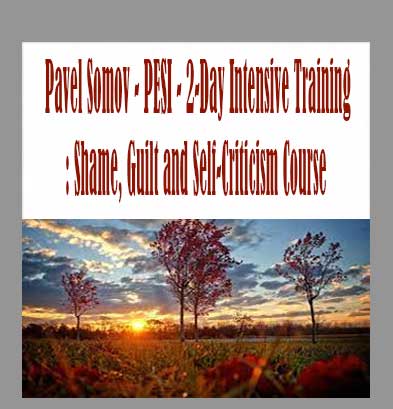
Description
Pavel Somov – PESI – 2-Day Intensive Training: Shame, Guilt and Self-Criticism Course download, Pavel Somov – PESI – 2-Day Intensive Training: Shame, Guilt and Self-Criticism Course review, Pavel Somov – PESI – 2-Day Intensive Training: Shame, Guilt and Self-Criticism Course free
Pavel Somov – PESI – 2-Day Intensive Training: Shame, Guilt and Self-Criticism Course
There’s no better feeling than providing relief from suffering. From the chronically stressed, to those grappling with trauma, dysfunctional relationships with food, substance use issues or anger — you love the fulfillment of making a difference.
But shame, guilt, and self-criticism play a critical role in these problems and can dramatically disrupt therapy. You worry that you’ll fail to convince clients who feel unworthy that they deserve a better life. And you’re left frustrated, drained and unsure what will move therapy forward when fears about failure and inadequacy create a state of paralysis in shame-driven and self-critical clients.
This recording will give you the skills and tools you need to end the tyrannical hold of shame, guilt and self-criticism and empower your clients to develop the acceptance of themselves, others and reality necessary for the effective treatment of trauma, stress, anxiety, depression, binge eating, substance use, and anger issues.
Experience the satisfaction of greater therapeutic success when you can help clients release unhealthy shame and cultivate the self-acceptance they need to move toward a brighter future!
Speaker
Pavel Somov Somov, PhD
Licensed Psychologist and Self-Help author
Private Practice
Objectives
- Characterize how shame, guilt, and apathy can function as impediments to clinical progress.
- Establish how clinicians can teach clients techniques to negate the sweeping generalizations that can lie behind shame.
- Discriminate guilt from regret and communicate how this informs therapeutic approach.
- Communicate how normalizing strategies can be used with clients to dissipate self-doubt.
- Articulate how Choice Awareness Training can be used in therapy to combat motivational apathy.
- Specify how techniques that reframe symptoms as strengths can be used to increase therapeutic effectiveness with self-critical clients.
- Assess the impact of exposure and mindfulness interventions on affect avoidance.
- Establish how exercises that help clients rediscover their self-worth can be used in trauma treatment.
- Communicate how shame pushes clients into binge eating and clarify how self-acceptance interventions can be used to reduce emotional eating.
- Determine how shame acts as a cover for anger and explain how compassion exercises can be employed to help clients let go of anger.
- Analyze research that establishes shame as a risk factor for suicide in depressed individuals.
- Address the importance of managing shame in clients with substance use issues in efforts to prevent relapse.
Outline
Shame, Guilt and Motivational Apathy as Impediments to Clinical Progress
- Therapy as a trigger and affect avoidance
- Clinical impasses (underutilization, stagnation, premature termination)
- Shame, guilt and a sense of not-deserving
- Secrets from self and from therapist
Tools for Catalyzing Progress in Therapy
- Normalizing, de-pathologizing, un-diagnosing
- Dialectic reframing & evolutionary psychology
- Mindfulness & metacognition
- Self-acceptance & self-compassion
- Neuroplasticity of internalization
Shame: Clinical Techniques to Move Therapy Forward
- Debunking the myth of self-sabotage
- Manage outside judgement with a self-referenced identity
- Techniques to negate sweeping generalizations
- Foster self-forgiveness with motivational innocence
Guilt: Help Clients Overcome the Debts of Guilt
- Differentiate guilt from regret
- Ordinary perfection & self-acceptance
- Master the fear of making mistakes
Self-Doubt, Dilemmas & Indecision: Interventions for Clients Paralyzed by Uncertainty
- Normalizing strategies to dissipate self-doubt
- Manage the anxiety of unpredictability with uncertainty training
- Make decisions easier with the art of arbitrary choice
- Reframe a dilemma as a choice between two rights
Motivational Apathy & Self-Inefficacy: Strategies to Improve Motivation and Autonomy
- Find a reason-to-change with the change equation
- Techniques that leverage intrinsic motivation
- Find freedom-to-change with Choice Awareness Training (CAT)
- Pattern interruption for habit change – get clients off autopilot
Self-Criticism and Self-Stigmatization: Quiet Your Client’s Inner Critic
- Varieties of self-deprecation (self-criticism, self-loathing, etc.)
- Techniques to reframe symptoms as strengths
- Compassion exercises for problematic habits of self-care
- Recover from the disease model
Working through Affect Avoidance
- Exposure, mindfulness & metacognition
- Top-down & bottom-up emotional self-regulation
- Cue-conditioning of self-Regulation
Connect Specific Strategies to the Treatment of:
Trauma
- Damaged goods, survivor’s guilt & avoidance of conflict
- Somatic interventions to restore the original goodness
- Strategies to survive without guilt
- Conflict avoidance: Paper tigers v. real tigers
- Exercises to rediscover self-worth
Stress and Anxiety
- Mediate the paralysis of perfection with self-acceptance
- Non-neurotic, stress-free perfectionism
- Social anxiety as shame & self-doubt: disapproval inoculation & self-referencing
- Mindfulness-based, non-anxious self-consciousness
Emotional Eating & Binge Eating
- How shame pushes clients into binge eating
- Choice Awareness Training for moderation & presence
- Self-acceptance strategies for emotional eating
- Transcend body shame by dis-identifying from the physical
Anger
- Shame of fear: Shame as a cover for anger
- The vicious guilt-anger loop
- Self-acceptance techniques for internal damage control
- Compassion exercises to let go of anger
Depression
- Depression as self-exile
- Shame as a risk factor for suicide
- Mindfulness for managing rumination
- Metacognitive silence: From negative self-talk to selfaccepting non-talk
Substance Abuse
- Addressing the shame of relapse
- Self-assertive trigger avoidance
- Choice awareness techniques for habit modification
- Build craving/impulse control skill power
Betrayal, Secrecy & Deception
- Separation & divorce as self-care & progress
- Secrets from therapist without rupture of rapport
- De-pathologizing the motives behind lying & deception
Research, Limitations and Potential Risks
Target Audience
- Counselors
- Social Workers
- Psychologists
- Addictions Counselors
- Case Managers
- Marriage & Family Therapists
- Other Mental Health Professionals
- Chaplains/Clergy
Frequently Asked Questions:
- Innovative Business Model:
- Embrace the reality of a genuine business! Our approach involves forming a group buy, where we collectively share the costs among members. Using these funds, we purchase sought-after courses from sale pages and make them accessible to individuals facing financial constraints. Despite potential reservations from the authors, our customers appreciate the affordability and accessibility we provide.
- The Legal Landscape: Yes and No:
- The legality of our operations falls into a gray area. While we lack explicit approval from the course authors for resale, there’s a technicality at play. When procuring the course, the author didn’t specify any restrictions on resale. This legal nuance presents both an opportunity for us and a boon for those seeking budget-friendly access.
- Quality Assurance: Unveiling the Real Deal:
- Delving into the heart of the matter – quality. Acquiring the course directly from the sale page ensures that all documents and materials are identical to those obtained through conventional means. However, our differentiator lies in going beyond personal study; we take an extra step by reselling. It’s important to note that we are not the official course providers, meaning certain premium services aren’t included in our package:
- No coaching calls or scheduled sessions with the author.
- No access to the author’s private Facebook group or web portal.
- No entry to the author’s exclusive membership forum.
- No direct email support from the author or their team.
We operate independently, aiming to bridge the affordability gap without the additional services offered by official course channels. Your understanding of our unique approach is greatly appreciated.
- Delving into the heart of the matter – quality. Acquiring the course directly from the sale page ensures that all documents and materials are identical to those obtained through conventional means. However, our differentiator lies in going beyond personal study; we take an extra step by reselling. It’s important to note that we are not the official course providers, meaning certain premium services aren’t included in our package:
Refund is acceptable:
- Firstly, item is not as explained
- Secondly, Item do not work the way it should.
- Thirdly, and most importantly, support extension can not be used.
Thank you for choosing us! We’re so happy that you feel comfortable enough with us to forward your business here.








Reviews
There are no reviews yet.